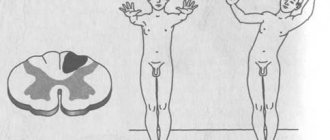The Electra complex in girls and women is an analogue of the Oedipus complex in men. Both terms are based on heroes of ancient Greek mythology and literature, whose fates are to a certain extent similar. Oedipus is the hero of Sophocles' tragedy, the king of Thebes, who was predicted that he would kill his father and marry his mother; he left his adoptive father and on the way killed his own, without knowing it. Arriving in Thebes, he became king and married his father's widow. For this, the gods punished the city with an epidemic, which is why the wife hanged herself. Oedipus, in madness, blinded himself, believing that he was not worthy even to die, and lived in torment, and even cursed his children. The complex named after him signifies the boy’s jealousy of his father for his mother’s attention.
Similarly, the Electra complex is a girl’s rivalry with her mother for her father’s attention. Electra is the daughter of King Agamemnon, who is killed by his wife when he returns from the Trojan War. The girl was left without an inheritance, so she took cruel revenge on her mother.
What is the Electra complex
The Electra complex is a psychological syndrome in which a girl or girl suffers from excessive attachment to her father and hatred of her mother. Girls from single-parent and dysfunctional families are at risk. Divorce, mother's authoritarianism or father's cruelty, father's indifference and passivity - all this can trigger the development of the syndrome. With its help, the girl’s psyche tries to protect itself from the destructive influence of psychotrauma.
Some mothers themselves contribute to the development of the Electra complex in girls. For example, when they scold and humiliate a girl’s father, they try to create a negative image in the child’s head. Or when they don’t allow men (father, brother, uncle, etc.) to be involved in raising them, or when they change “new dads” too often. All this traumatizes the child even more, because of which the girl hates her mother even more and idealizes her father even more, and at the same time withdraws into herself. For the normal development of a girl, it is important to have a positive male example and emotionally warm interaction with an adult of the opposite sex.
Interesting! Sometimes the Electra complex in psychology is called a form of psychological incest.
History of the complex
In psychology, this concept was introduced by Carl Gustav Jung, but the phenomenon itself was first considered by Sigmund Freud. Freud did not come up with a separate name and characterized Electra syndrome as a female manifestation of the Oedipus complex (painful attachment of a son to his mother).
Freud believed that all girls go through the Electra complex to one degree or another; this is an integral stage of growing up. At what stage, according to Freud, does the Electra complex appear? At the phallic stage, that is, at the age of 3–6 years. The psychoanalyst believed that excessive attachment to the father is associated with an unconscious sexual attraction to him, the girl’s awakening interest in the genitals, envy and awareness of her difference from her father. Under normal developmental conditions, this passes, the girl identifies herself with her mother, and the craving for her father transforms into a search for a man similar to him. Under unfavorable development conditions, the complex becomes fixed.
Interesting! The name of the syndrome is based on the ancient Greek myth of Electra, the daughter of Agamemnon and Clytemnestra. Electra blamed her mother and her lover for the death of her father, out of revenge she persuaded her brother to kill both of them and helped him in this.
Freud's opinion
The great scientist believed that the Electra and Oedipus complexes are the pillars of psychoanalysis. In his opinion, most neurotic reactions in a person are formed in connection with an unconscious attraction to the parent who is of the opposite sex. The mental life that will be characteristic of the individual in the future directly depends on the resolution or unsuccessful closure of such complexes. In addition, such phenomena can be considered the first manifestations of sexuality in children. In his works, Freud also pointed out that the described complexes are directly related to religiosity, public relations and morality of an adult person. According to the scientist, Electra syndrome and the Oedipus complex are the main causes of neurotic diseases.
It is interesting that when developing the theory, the scientist closely observed his inner world. At the same time, he discovered that he also had a craving for his mother.
Varieties of the Electra complex
The syndrome develops against the background of the loss of dad. Moreover, we are talking about both death and a man leaving the family or being overly busy at work. In general, the condition is caused by a lack of correct communication with the father, adequate manifestations of love, attention and warmth on his part. At the same time, the syndrome develops against the background of cruel, aggressive, cold communication between father and daughter. In all cases, the girl tries to find an excuse for her dad, the subconscious suggests only one option - to blame the mother and idealize the father.
Psychologists distinguish two types of syndrome:
- a woman competes with men (strong, successful, lonely);
- the woman finds herself in the role of a victim (accusing others of being unhappy, unable to realize herself, build a career and personal life).
Note! In some cases, the syndrome is associated with excessive care and guardianship on the part of the father, an abundance of communication and joint games with his daughter.
Mythological base
Photo by Anna Shvets: Pexels
Oedipus is a hero of ancient Greek myths, the son of King Laius and his wife Jocasta. As punishment for the abuse of young Chrysippus, Laius was predicted to die at the hands of his son, so Oedipus was mutilated at birth and thrown into the forest. Oedipus was raised by King Polybus and his wife Merope.
Over the years, Oedipus learned about the prophecy, but since he considered Polybus his father, he fled from his kingdom.
While fleeing, he quarrels with the owner of the chariot, which got in his way and kills him. The owner of the chariot turns out to be Lai.
Oedipus, not knowing who his real father is, meets on his way the place of his birth - the kingdom of Laius, having successfully fought with the Sphinx, who annoyed the inhabitants of the kingdom, he becomes king, in gratitude, the inhabitants marry Jocasta, Laius's widow and his mother, to Oedipus . Having lived in a happy marriage for twenty years, the couple learns that Oedipus is the son of Jocasta. Out of grief, the woman hanged herself, and Oedipus gouged out his eyes with Jocasta's clasp.
This is the story, why isn’t it a reason to call the problematic stages of a child’s development “Oedipus complex”?
How to recognize
You can suspect the presence of an Electra complex in a woman’s psychology based on the following signs in female behavior:
- She can’t find a man, she sees something bad in everyone. The applicants do not live up to the ideal image of a father.
- She expects heroic actions from men and is disappointed because real relationships differ from her fantasies.
- Inadequately perceives the male and female roles in relationships. Hatred towards women transforms into self-hatred.
All women with an Electra complex are stuck in the victim role, suffering from low self-esteem and lack of self-worth. Mentally, they turn mother into a tyrant and father into a hero. In the sphere of personal life, they expect that a new rescuer like her father will appear, that men will constantly solve her problems, act as heroes, and feel sorry for her.
Interesting! Often women with Electra syndrome themselves look and act like men, are not feminine, but at the same time expect to be treated like princesses.
How does the Electra complex manifest itself?
The first signs of Electra syndrome become apparent at the age of 6-7 years, but the peak manifestation of the complex occurs in adolescence. The older the girl, the brighter her reactions:
- shouts at his mother and insults her;
- is hysterical and jealous of dad towards other women;
- fantasizes a lot about the ideal father-daughter relationship;
- experiences an unhealthy emotional attachment to dad;
- idealizes the image of the father.
The girl tries to spend every second of time with her dad, sharing the details of her life and personal experiences.
Nancy Cater's theory
According to N. Carter, a girl suffering from an unhealthy attachment to her father is deprived of the opportunity to achieve moral maturity. Already an adult woman, at heart she remains a little girl, experiencing a complex of contradictory emotions: admiration for her father’s figure is closely related to anger and disappointment.
The woman continues to experience the bitterness of loss, accepting the role of the victim. Even in families with a tyrant father, love overshadows resentment and disappointment for the daughter. She transfers her resentment to her mother, considering her to be to blame for her father’s departure. Faced with the impossibility of development, a woman transfers the active qualities of her personality to men. She sees herself as a princess who must be saved by a prince.
Algorithm for getting rid of the Electra complex
Work plan to get rid of the syndrome:
- Go through all the stages of grief, give free rein to anger and accept the loss of your father (mental or physical).
- Find the negative qualities of dad, accept the negative sides of his image.
- Restore relationships with your mother and yourself, that is, regain your femininity.
- Become a self-sufficient person, that is, stop perceiving men as a tool to satisfy your needs, learn to take care of yourself, protect and provide for yourself.
It is important! Treatment is impossible without recognizing the problem.
Reasons for appearance
The main reason for the need to idealize the father is the inability to create normal relationships with parents in real life. The Electra complex becomes established in girls growing up:
- in single-parent families with a single mother;
- in two-parent families with an authoritarian mother and a weak-willed passive father;
- in families with an authoritarian father and a victim mother.
For a child, any negative family scenario is a trauma that affects the formation of the psyche. Observing constant scandals, depression of one or both parents, the girl tries to avoid the destructive influence of a negative environment. The appearance of the Electra complex is the only way for the psyche to preserve the integrity of its worldview and to protect itself.
Exercises
A technique that helps you say goodbye to your father:
- Find a comfortable position and relax.
- Imagine dad.
- Thank him for all the good things, try to remember real, specific situations.
- Give yourself permission to live freely and say goodbye to your father.
Technique for reconciliation with mother:
- Remember the conflict situation between mother and father, in which you see the mother as to blame. Try to find a positive explanation for her behavior.
- Make a list of the things you and your mother have in common. Every person has something of both parents.
- Learn to communicate with your mother in real life from the “Adult – Adult” position.
- Mentally or in real communication, thank your mother and forgive her.
Femininity
Every person has feminine and masculine energy, it is important to maintain balance, flexibility and plasticity. For example, it is worth taking from men purposefulness, courage, determination, organization, and restraint. However, at the same time, it is important to remain emotionally alive, gentle, compliant, and patient. The essence of plasticity is that a person decides for himself when to show masculine qualities and when to show feminine ones. For example, at work a girl may well be a strict boss, but in relationships with a man and children she becomes soft, gentle, and affectionate.
How to get rid of the victim role
To get rid of the victim role, it is important to analyze the condition into components and fight each of them:
- numerous phobias (fear of loneliness, rejection, condemnation);
- lack of understanding of one’s emotions, desires and needs, inability to express them;
- a ban on aggression (negativity accumulates and destroys from within);
- non-acceptance of oneself and dislike for oneself;
- blurred personal boundaries or their complete absence.
Rules for getting out of the victim role
According to the components of the victim role, the following rules for exiting it can be distinguished:
- Express all emotions, including negative ones, but do it in a socially acceptable way.
- State your needs, desires, interests, opinions.
- Accept and love yourself.
- Set personal boundaries and learn to protect them (without violence and aggression).
- Never tolerate anything.
- Get rid of phobias, learn to live alone with yourself.
- Gain physical, psychological, material, social independence.
Summary of the Theban myth of Oedipus
In Ancient Greece, the myth of King Oedipus was very popular.
And still the sad story does not leave people indifferent. Oedipus, not realizing what he was doing, killed his own father. Then he married his mother, with whom he lived for many years and had children. When the gods revealed the secret to them, Jocasta committed suicide. The soul of Oedipus was plunged by the Erinyes, the goddesses of vengeance, into severe torment, which is why he gouged out his eyes. Articles on the topic
- How and where does fear of people come from 12/13/2021
- Neurosis of fear - how it subjugates a person and poisons his life 11/30/2021
- Unreasonable fear: how to get rid of the problem 11/21/2021
- Crisis psychotherapy: real help for people on the edge 11/15/2021
The myth was loved by the Attic tragedians, who developed and supplemented it. They fully demonstrated to the people thoughts about the meaning of fate in a person’s life and the fragility of his hopes and aspirations.











